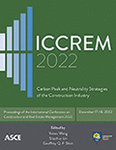Influence of Risk Allocation on Construction Project Management Performance: The Mediating Effect of the Contractor’s Performance Behavior
Publication: ICCREM 2022
ABSTRACT
The contractor’s performance behavior is critical to improving construction project management performance. Therefore, the owner can design contract terms of risk allocation to motivate the contractor’s performance behavior, resulting in improved project management performance. In this study, a theoretical model involving risk allocation as an independent variable, project management performance as a dependent variable, and contractor’s performance behavior as a mediator was built to investigate how risk allocation indirectly contributes to the improvement of project management performance. The contractor’s performance behavior is divided into perfunctory performance behavior, consummate performance behavior, and opportunistic behavior. A total of 208 valid questionnaires from the Chinese construction industry were collected and analyzed. The empirical results show that proper risk allocation can induce both contractor’s perfunctory behavior and consummate behavior, and control opportunistic behavior, thus achieving project basic performance. Although the mediating effect of perfunctory behavior is not significant, consummate behavior and opportunistic behavior can play a mediating role between risk allocation and project value-added performance. The findings can enlighten the owner and contractor to choose a proper risk allocation strategy.
Get full access to this article
View all available purchase options and get full access to this chapter.
REFERENCES
Abednego, M. P., and Ogunlana, S. O. (2006). “Good project governance for proper risk allocation in public-private partnerships in Indonesia.” International Journal of Project Management, 24(7), 622–634.
Ahwireng-Obeng, F., and Mokgohlwa, J. P. (2002). “Entrepreneurial risk allocation in public-private infrastructure provision in South Africa.” South African Journal of Business Management, 33(4), 29–39.
Anvuur, A. M., and Kumaraswamy, M. M. (2012). “Measurement and antecedents of cooperation in construction.” Journal of Construction Engineering and Management, 138(7), 797–810.
Atkinson, R. (1999). “Project management: Cost, time and quality, two best guesses and a phenomenon, its time to accept other success criteria.” International Journal of Project Management, 17(6), 337–342.
Carson, S. J., Madhok, A., and Wu, T. (2006). “Uncertainty, opportunism, and governance: The effects of volatility and ambiguity on formal and relational contracting.” Academy of Management Journal, 49(5), 1058–1077.
Chin, W. W., and Marcoulides, G. (1998). “The partial least squares approach to structural equation modeling.” Modern Methods for Business Research, 295(2), 295–336.
Cho, K., Hong, T., and Hyun, C. (2009). “Effect of project characteristics on project performance in construction projects based on structural equation model.” Expert Systems with Applications, 36(7), 10461–10470.
Connelly, B. L., Crook, T. R., Combs, J. G., Ketchen, D. J., Jr., and Aguinis, H. (2018). “Competence-and integrity-based trust in interorganizational relationships: Which matters more?” Journal of Management, 44(3), 919–945.
Fornell, C. G., and Larcker, D. F. (1981). “Evaluating structural equation models with unobservable variables and measurement error.” Journal of Marketing Research, 18(1), 39–50.
Hart, O., and Moore, J. (2008). “Contracts as reference points.” The Quarterly Journal of Economics, 123(1), 1–48.
Hosseinian, S. M., and Carmichael, D. G. (2013). “Optimal incentive contract with risk-neutral contractor.” Journal of Construction Engineering and Management, 139(8), 899–909.
Hulland, J. (1999). “Use of partial least squares (PLS) in strategic management research: A review of four recent studies.” Strategic Management Journal, 20(2), 195–204.
Liu, J., Wang, Z., Skitmore, M., and Yan, L. (2019). “How contractor behavior affects engineering project value-added performance.” Journal of Management in Engineering, 35(4), 04019012.
Loosemore, M., and McCarthy, C. S. (2008). “Perceptions of contractual risk allocation in construction supply chains.” Journal of Professional Issues in Engineering Education and Practice, 134(1), 95–105.
Jin, X. H., and Zhang, G. (2011). “Modelling optimal risk allocation in PPP projects using artificial neural networks.” International Journal of Project Management, 29(5), 591–603.
Jannadia, M. O., Assaf, S., Bubshait, A. A., and Naji, A. (2000). “Contractual methods for dispute avoidance and resolution (DAR).” International Journal of Project Management, 18(1), 41–49.
Tadelis, S. (2012). “Public procurement design: Lessons from the private sector.” International Journal of Industrial Organization, 30(3), 297–302.
Tang, Y. Q., Chen, Y. Q., Hua, Y. Y., and Fu, Y. C. (2020). “Impacts of risk allocation on conflict negotiation costs in construction projects: Does managerial control matter?” International Journal of Project Management, 38(3), 188–199.
Wathne, K. H., and Heide, J. B. (2000). “Opportunism in interfirm relationships: Forms, outcomes, and solutions.” Journal of Marketing, 64(4), 36–51.
Yan, L., Wang, Z. X., and Deng, J. J. (2018). “Research on structural dimensions and measurement of contractors’ performance behavior in construction project based on theory of contract reference point.” China Civil Engineering Journal, 51(8), 105–117. (in Chinese).
Yan, L., Wang, M. J., and Ning, Y. (2019). “Detailed construction contract, contractor performance behavior and project performance: An empirical analysis of a mediation model.” Industrial Engineering and Management, 24(4): 181–188+196. (in Chinese).
Yin, Y. L., Lin, Q., Xiao, W. Y., and Yin, H. (2020). “Impacts of risk allocation on contractors’ opportunistic behavior: The moderating effect of trust and control.” Sustainability, 12(22), 9604.
Yin, Z. J., Tang, J. D., Zhao, W. J., and Liu, L. (2021). “Research on the mechanism of contract terms for risk allocation inducing contractor to consummate performance from the perspective of social preference.” Journal of Engineering Management, (1), 113–118. (in Chinese).
Zhang, S. B., Zhang, S. J., Gao, Y., and Ding, X. M. (2016). “Contractual governance: Effects of risk allocation on contractors’ cooperative behavior in construction projects.” Journal of Construction Engineering and Management, 142(6), 04016005.
Information & Authors
Information
Published In
History
Published online: Dec 15, 2022
Authors
Metrics & Citations
Metrics
Citations
Download citation
If you have the appropriate software installed, you can download article citation data to the citation manager of your choice. Simply select your manager software from the list below and click Download.
